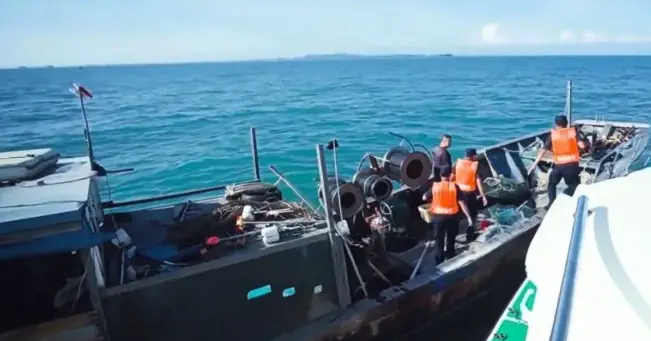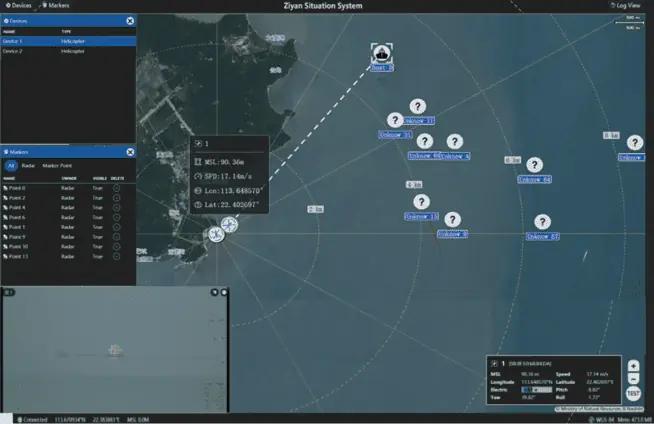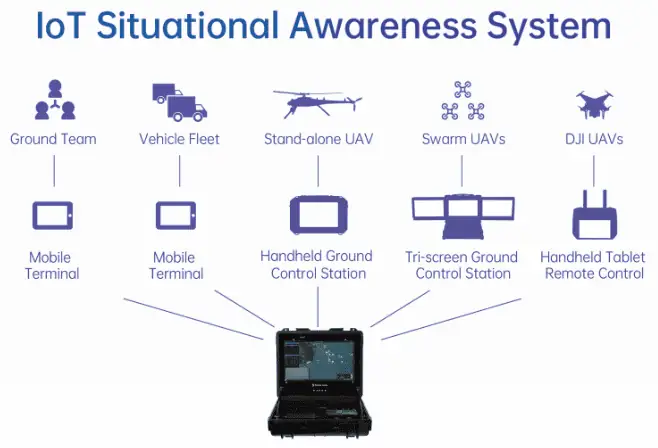Ziyan UAS discusses how its Internet of Things (IoT) situational awareness system can be used in Maritime Law Enforcement to help drones automatically track suspicious vessels.
As the shipping industry expands and global trade deepens, ship freight and traffic increases significantly, making navigation environments increasingly complex.
Consequently, the workload of maritime law enforcement agencies continues to grow. In real-world maritime law enforcement scenarios, situations vary widely. For instance, when radar scans detect multiple suspicious vessels in their jurisdiction, the challenge is how to inspect each one to determine if any illegal activities are occurring and gather any evidence.
Limitations of traditional patrol methods:
Traditional patrol boats rely on on-site enforcement, requiring substantial manpower and resources, with issues such as delayed supervision, difficulty in obtaining evidence, and personnel safety concerns.

Utilizing drones for patrol leverages their high flexibility and aerial perspective advantages, allowing access to visual blind spots that are difficult to detect during surface patrol, significantly improving patrol efficiency and quality. However, due to real-time changes in ship positioning, enforcement teams must communicate frequently to synchronize the real-time radar positions of vessels and update flight instructions to drones. This results in a significant amount of time spent on communication synchronization, with the workload remaining relatively heavy, affecting enforcement efficiency.
How to overcome the limitations of traditional patrols and enable drones to automatically track suspicious vessels?
Enter Ziyan’s “IoT Situational Awareness System.” This system connects with ground radar, automatically matching radar scan results with AIS systems to efficiently screen suspicious vessels. It also receives real-time position information of vessels from radar and synchronizes this information to drones. This allows drones to automatically track suspicious targets, capture photographic evidence, effectively reducing communication costs between enforcement teams, lowering the difficulty of flight operations, and enhancing drone patrol efficiency.
In addition, the IoT Situational Awareness System can simultaneously integrate various types of devices, consolidating the positioning and imaging information of multiple devices into a single interface. Enforcement personnel can view real-time flight dynamics of multiple drones and the video footage they capture on the system interface. Additionally, existing shipborne electro-optical systems can be integrated, enabling multiple devices to work together, forming a combined surveillance force. Through flexible switching via system buttons, officers can “point and view,” achieving comprehensive situational awareness.

What is the IoT Situational Awareness System?
In simple terms, the IoT Situational Awareness System serves as an “online command center,” utilizing the Internet of Things to collect, analyze, and monitor data in real-time, assisting in comprehensive situational awareness. Its main functions include real-time unidirectional or multidirectional sharing of location information, sharing of annotated information and remarks, interaction and reuse of annotated information and location information, real-time live streaming of videos, and image sharing.
In addition to integrating Ziyan’s branded product series, the IoT Situational Awareness System also supports the integration of other brands of drones, electro-optical payloads, monitoring balls, individual/special vehicle positioning devices, and other individual devices, showcasing strong expandability and extensive application scenarios. It also supports multi-level interconnection of IoT Situational Awareness Systems, enabling different levels of permission management.

Rich video format transmission
Supports various mainstream video codec input/output and transmission protocols, addressing the complexity and multiplicity of video sources.
Alleviating video transmission pressure
Through multi-channel video codec, multiple streams can be mixed into one picture and re-encoded for transmission, reducing the communication pressure of live video transmission on-site.
Adaptation to complex rear network environments
With built-in router management capabilities, it effectively adapts to complex rear network environments, allowing efficient video transmission to enter the command center.
Quick switching of multiple video streams
Plug and play, with multiple buttons corresponding to the switching of multiple video streams, making operation simple and easy.
In addition to its application in the maritime domain, the IoT Situational Awareness System can also be applied in border defense, fishery management, and other scenarios, providing law enforcement agencies with intelligent and efficient visual technology support.




Small and Medium-sized UAVs
Industry-Proven Drone Solutions
Full-Customized Services
Flight Training Services
